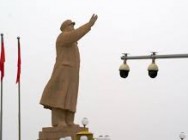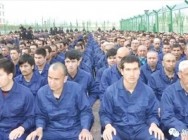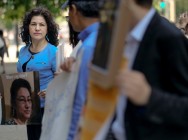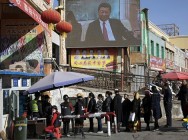Last Minute

- CHINA RELATIONSEAST TURKESTAN PROBLEM AND TURKEY
- FRONTLINE China Undercover
- Elimination of “Uyghur Counter-Revolutionary Officials” in Academic Fields—Exact Quotes Translated from a Mandarin Audio File
- In Push for Trade Deal, Trump Administration Shelves Sanctions Over China’s Crackdown on Uighurs
- Dalai Lama’s 60th Anniversary Symposium: İlshat Hassan speech in English and Chinese
- Uyghur Detainees from Xinjiang ‘Placed in Nearly Every Prison’ in Shandong Province
- Shahrezad Ghayrat, Unrepresented Women
- Uighur Americans Speak Against China’s Internment Camps. Their Relatives Disappear.
- Rozinisa: The true story of the Uyghur girls in the prison
- The Chinese Government Must Account for the Disappearance of the 10+ Million Uyghurs

-

CHINA RELATIONSEAST TURKESTAN PROBLEM AND TURKEY
-

FRONTLINE China Undercover
-

Elimination of “Uyghur Counter-Revolutionary Officials” in Academic Fields—Exact Quotes Translated from a Mandarin Audio File
-

In Push for Trade Deal, Trump Administration Shelves Sanctions Over China’s Crackdown on Uighurs
-

Dalai Lama’s 60th Anniversary Symposium: İlshat Hassan speech in English and Chinese
-

Uyghur Detainees from Xinjiang ‘Placed in Nearly Every Prison’ in Shandong Province
Beijing Steps Up Security Ahead of Urumqi Riot Anniversary
Authorities in the restive northwestern region of Xinjiang and the Chinese capital have stepped up security measures ahead of the fifth anniversary of deadly ethnic riots in the regional capital Urumqi, with a visible increase in the number of armed police on the streets, residents said.
“The whole city is on a security drive, and the number of personnel and vehicles doing patrols has clearly increased,” an Urumqi resident surnamed Zhang told RFA on Thursday.
“The police don’t have the numbers to cope, so they have hired a lot of other people to maintain stability, including citizen volunteers, patrol teams, and the red armband brigade,” Zhang said, referring to various civilian groups and neighborhood security teams whose job is to keep watch on local, mostly residential, areas.
“They are doing patrols and exercises on the streets right now; I see them often,” he said.
Zhang said the authorities have also introduced restrictions at gas stations in the city.
“I have seen notices up at a number of gas stations saying that the sale of gas in containers [other than a vehicle’s gas tank] is prohibited, regardless of ethnicity,” he said.
High-profile attacks
China is reeling following a string of high-profile attacks blamed on militants in Xinjiang, the traditional home of the Uyghurs, who complain they have long suffered ethnic discrimination, oppressive religious controls, and continued poverty and joblessness.
On May 22, unidentified attackers plowed two motor vehicles into an open market in Urumqi and set off explosives, leaving 31 people dead and more than 90 injured and prompting authorities to launch a one-year anti-terrorism campaign in the region.
The death toll is believed to be the highest in Xinjiang violence since bloody riots in Urumqi in 2009 between Uyghurs and majority Han Chinese left almost 200 people dead.
Dilxat Raxit, spokesman for the exile World Uyghur Congress (WUC) group, told RFA that tensions are already running high, as this year’s anniversary coincides with the Muslim holy month of Ramadan.
Muslim Uyghurs began a month of dawn-to-dusk fasting and prayers last weekend, amid increased surveillance from neighborhood security officials and security cameras in every mosque.
“This highly oppressive policy over Ramadan and the July 5 anniversary, together with a string of recent clashes, means there is a sense of panic,” Raxit said.
He said that anyone without a household registration in Urumqi will be stopped from entering the downtown areas, especially if they hail from the restive southern part of Xinjiang.
He said the measures will likely last until after July 6, the anniversary of clashes in northern Ili prefecture and the Silk Road city of Kashgar.
Tight security in Beijing
Meanwhile, authorities in Beijing have put similar curbs in place, residents said.
“There was a huge police presence ahead of July 1,” a Beijing resident surnamed Yang said, in a reference to the politically sensitive anniversary of the founding of the ruling Chinese Communist Party.
“Riding public transport down Chang’an Avenue, you could see that there were many, many more on the streets than is normal,” Yang said.
“They were all special police, carrying guns, and there were armed police carrying out patrols as well.”
“It is pretty full-on,” he said.
The measures won’t be relaxed until July 6, the Beijing Express newspaper reported, suggesting that authorities are also nervous around Saturday’s anniversary of the Urumqi violence, which exile Uyghur groups say was triggered after police fired on unarmed Uyghur demonstrators protesting attacks on Uyghur workers at a shoe factory in southern China.
An employee who answered the phone at a gas station in Beijing confirmed that they are forbidden to sell gas to anyone presenting an empty container.
“We can’t sell it,” the employee said, but added that they didn’t know why.
“You could buy it that way before, but the police sent out a directive a few days ago banning the sale of gas in canisters.”
Hard-line policies
According to Beijing-based rights activist Hu Jia, armed police have been driving around in armored vehicles and posting patrols inside subway stations across the city.
But he said that only better treatment of Uyghurs in their homeland will prevent further attacks.
“Natural resources like oil and natural gas have been pouring out of Xinjiang in recent years, but Uyghurs have had no share in all the massive profits from economic development and the exploitation of resources,” Hu said.
“Policies in Xinjiang have been hard-line rather than tolerant in recent years, especially since the July 5 incident in Urumqi,” he said.
“Sentences have been extremely heavy. People can get a seven-year jail term just for acting as interpreter to foreign media.”
“Anyone putting out negative content or complaints about the current political system on microblogs could get 10 years for separatism,” Hu added.
Beijing petitioner Wang Ling said that all police leave has been canceled in the capital ahead of the July 5 anniversary.
“The police aren’t allowed to take vacation ahead of July 5 … things are extremely tense here,” she said. “Security is particularly tight around Chang’an Avenue, Dongdan [shopping district], and the Beijing Railway Station.”
She said that Beijing has stepped up security in the wake of last November’s deadly jeep explosion that left three dead in Tiananmen Square, as well as a knife attack in March that killed 33 at a train station in the southwestern city of Kunming, which the government blamed on separatist Uyghur militants from Xinjiang.
Reported by Yang Fan for RFA’s Mandarin Service, and by Hai Nan for the Cantonese Service. Translated and written in English by Luisetta Mudie.
http://www.rfa.org/english/news/uyghur/riot-07032014105601.html
RELATED NEWS












